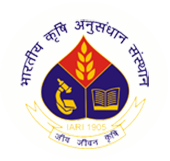 |
भा.कृ.अ.प. - भारतीय कृषि अनुसंधान संस्थान | ICAR-Indian Agricultural Research Institute |
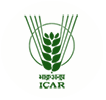 |


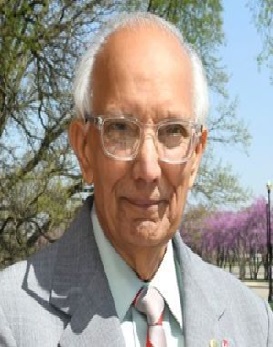
Dr. Rattan Lal
Awarded in (2021)
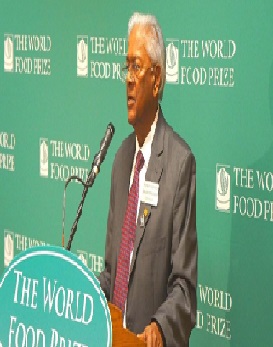
Dr. Sanjaya Rajaram
Awarded in (2014)
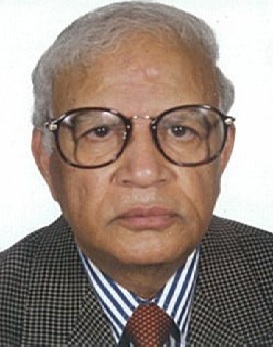
Dr. Surinder K. Vasal
Awarded in (2000)
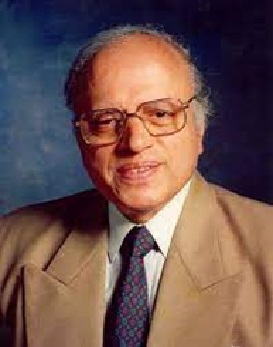
Dr. M.S. Swaminathan
Awarded in (1987)
Awarded in (2021)
Rattan Lal estimates he was born in 1944 in the small farming village of Karyal in West Punjab, India. In 1947, when India gained independence, Lal’s Hindu family found themselves in the newly partitioned Pakistan. They departed and resettled as refugees in Rajaund, Haryana, India, about 100 miles northwest of Delhi. Lal had the chance to study soils more upon entering Punjab Agricultural University in Ludhiana after earning a scholarship for graduating at the top of his class from his two-room school in Rajaund in 1959. He completed his his M.Sc. at the Indian Agricultural Research Institute in Delhi. Starting in 1970 at the International Institute of Tropical Agriculture (IITA) in Nigeria, Lal began addressing the issue of soil erosion and degradation in sub-Saharan Africa. He found that deforestation and agricultural cultivation exposed the soil to the harsh tropical climate, causing severe erosion. What’s more, removing the plant residue at harvest robbed the soil of nutrients, organic matter and organic carbon, making it harder and harder each season for farmers to grow a viable crop. Dr. Lal serves as Distinguished University Professor of Soil Science and founding Director of the Carbon Management & Sequestration Center at The Ohio State University (OSU). From his humble beginnings as a refugee growing up on a small subsistence farm in India, his determination to learn and succeed in school propelled him to become one of the world’s foremost soil scientists. His pioneering research on the restoration of soil health in Africa, Asia and Latin America led to revelations that impacted agricultural yields, natural resource conservation and climate change mitigation. The agricultural practices Lal advocated are now at the heart of efforts to improve agriculture systems in the tropics and globally.
Because of Lal’s leadership in linking soil carbon to climate change, three separate United Nations Climate Change Conferences adopted his strategy of restoring soil health as a means to sequestering carbon. This gave rise to the “4 per 1000” Initiative to increase soil carbon at an annual growth rate of 0.4 percent through implementing the conservation farming practices Lal had already adapted to regional conditions. Lal’s proposals on soil health closely tie into four of the 17 Sustainable Development Goals. In 2007, he was among those recognized with a Nobel Peace Prize Certificate for his contributions to the Intergovernmental Panel on Climate Change (IPCC) reports when the IPCC was named co-recipient of the Prize. Prior accolades recognizing Dr. Lal for the exceptional energy and insight he applies to the crusade for conservation around the world include the Japan Prize (2019), the GCHERA World Agriculture Prize (2018), the Glinka World Soil Prize (2018), the Liebig Award (2006), and in India, the Swaminathan Award (2009) and the Norman Borlaug Award (2005). Dr. Rattan Lal, received the 2020 World Food Prize for developing and mainstreaming a soil-centric approach to increasing food production that restores and conserves natural resources and mitigates climate change.
Awarded in (2014)
Born in 1943, Rajaram grew up in a modest household near a small farming village of Raipur in Varanasi district, Uttar Pradesh. His family made a living off their 5-hectare farm growing wheat, maize and rice. Rajaram, meanwhile, went to a village school about 5 km from his home, where he completed his primary and secondary school education. A bright student, he won a scholarship to attend high school, following which he went to the University of Gorakhpur where he obtained a BSc in agriculture. Following graduation, he obtained his master’s degree from the Indian Agricultural Research Institute in New Delhi, where he studied genetics and plant breeding under Dr MS Swaminathan, renowned for his leading role in India’s Green Revolution. Rajaram began his tenure at CIMMYT in 1969 working alongside Borlaug in experimental fields of Ciudad Obregón, Toluca and El Batán in Mexico. With their base of operations in El Batán, southern central Mexico, CIMMYT is a “non-profit international agricultural research and training organisation focusing on two of the world’s most important cereal grains: maize and wheat, and related cropping systems and livelihoods,” notes their website. His most significant contribution to the discourse around plant breeding was the development of high volume ‘shuttle breeding’. According to this paper published in 1989, “Shuttle breeding uses diverse ecological environments to develop improved varieties with higher adaptability.” Borlaug would also lead efforts at breeding improved varieties of wheat in India as well, and become the scientist who helped engineer the country’s Green Revolution as well. He was awarded the Nobel Prize in 1970 for his efforts in saving millions from starvation. From 1969 to 1972, Rajaram would conduct his research and fieldwork under the supervision of Borlaug before succeeding him to lead the wheat breeding team at CIMMYT. According to the World Food Prize citation, “Like Borlaug, Rajaram had the extraordinary ability to visually identify and select for crossbreeding the plant varieties possessing a range of desired characteristics, an ability that was essential to wheat breeding in the 1980s and ’90s.” “Rajaram also developed wheat cultivars with durable resistance to rusts—the most damaging disease to wheat worldwide—through his concept of ‘slow rusting’. He used multiple genes with minor effects that slow down disease development, thereby minimizing the impact on yield without challenging the rust pathogen to mutate and overcome resistance. The varieties produced using this technique have been grown on millions of hectares worldwide. His method proved a cost-effective and environmentally sound way to control plant disease,” notes the citation he received after winning the World Food Prize in 2014. Celebrating his incredible achievement, the Indian government posthumously awarded him the Padma Bhushan, the third-highest civilian honour in 2001.
Awarded in (2000)
Surinder K.Vasal was born in 1938 in Amritsar, India, where he grew up. He completed his university education in India and earned a Ph.D. in genetics and plant breeding from the Indian Agricultural Research Institute. In 1959, Vasal launched his career as a researcher for the Department of Agriculture in Himachal Pradesh and later worked as a maize breeder at Himachal Agricultural College. In 1970, he moved to a position at the International Maize and Wheat Improvement Center (CIMMYT) in Mexico, where World Food Prize founder Norman Borlaug had revolutionized wheat production some 30 years earlier. There, Vasal worked with and later supervised the high lysine maize project. It was then that Vasal and Dr. Evangelina Villegas began their collaborative research. From 1985 to 1996, Vasal was responsible for coordinating CIMMYT’s germplasm program and Lowland Tropical Maize Program. The development of QPM remained unexploited for years because many nutritionists felt that protein could be added to the diets of the poor in other ways. For their research at CIMMYT that led to the development of QPM, Villegas and Vasal were awarded the Millennium World Food Prize in 2000. Their combined work improved the diets of millions of the world’s most underfed and poorly nourished citizens, especially very young children. Vasal is a member of the American Society of Agronomy, the Crop Science Society of America (whose Presidential Award he won in 2000), and India’s National Academy of Sciences. He received the 1996 International Service in Crop Science Award and the 1999 International Agronomy Award, in addition to accolades from governments of or institutions in Honduras, Peru, Panama and India. Former CIMMYT Director General Timothy Reeves stated, “The efforts of Drs. Villegas and Vasal have laid the foundation for what will be one of the most important contributions to food security in human history.”
Awarded in (1987)
Dr. M.S. Swaminathan, born on 7 August 1925, is popularly known as the Father of Green Revolution in India. He is the Founder Chairman, Emeritus Chairman and Chief Mentor of the M. S. Swaminathan Research Foundation (MSSRF) at Chennai, which he founded in 1988. Dr. Swaminathan obtained a B.Sc. degree in Zoology from the Maharajas College in Thiruvananthapuram, and also in Agricultural Sciences from the Coimbatore Agricultural College. Subsequently, he received M.Sc. degree in Agricultural Sciences (specializing in genetics and plant breeding) from the Indian Agricultural Research Institute (IARI) in 1949 and Ph.D. degree from Cambridge University, UK in 1952. Dr. Swaminathan joined the faculty of IARI, New Delhi, in 1954. He became the Director of IARI (1961-72), Director General of Indian Council of Agricultural Research (ICAR) and Secretary to the Government of India, Department of Agricultural Research and Education (1972-79), Principal Secretary in the Ministry of Agriculture (1979-80), Acting Deputy Chairman and later Member (Science and Agriculture), Planning Commission (1980-82), and Director General, International Rice Research Institute, the Philippines (1982-88). A plant geneticist by training, Dr. Swaminathan has made a stellar contribution to the agricultural renaissance of India, and is widely regarded as the scientific leader of India’s green revolution movement. His advocacy of sustainable agriculture leading to an evergreen revolution makes him an acknowledged world leader in the field of sustainable food security. The International Association of Women and Development conferred on him the first international award for significant contributions to promoting the knowledge, skill, and technological empowerment of women in agriculture, and for his pioneering role in mainstreaming gender considerations in agriculture and rural development. Dr. Swaminathan has received numerous awards and honours, including the S.S. Bhatnagar Award for his contribution to biological sciences (1961), Ramon Magsaysay Award for Community Leadership in 1971, the Albert Einstein World Science Award in 1986, the first World Food Prize in 1987, the Indira Gandhi Prize for Peace, Disarmament and Development, the Franklin D. Roosevelt Four Freedoms Medal and the Mahatma Gandhi Prize of UNESCO in 2000, and the Lal Bahadur Shastri National Award in 2007. Dr. Swaminathan is a proud recipient of some of India’s highest honours including Padma Shri (1967), Padma Bhushan (1972) and Padma Vibhushan (1989). He is a Fellow of many of the leading scientific academies of India and the world, including the Royal Society of London and the US National Academy of Sciences. He has received 81 honorary doctorate degrees from universities around the world. He was a Member of the Parliament of India (Rajya Sabha) for the period 2007-13. He also chairs the Task Force set up by the Ministry of External Affairs to oversee the projects undertaken in Afghanistan and Myanmar in the field of agriculture and was elected the “Living Legend of International Union of Nutrition Sciences” at the 20th International Congress of Nutrition held at Granada, Spain.